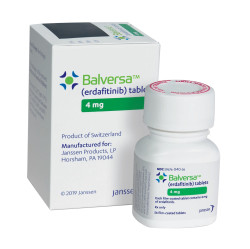Janssen has been delaying the Korean launch of its FGFR (fibroblast growth factor receptor) inhibitor Balversa (erdafitinib) for over a year, making many watchers wonder what's happening.
Janssen received approval for Balversa on Nov. 24, 2022, from the Ministry of Food and Drug Safety (MFDS).

Balversa is indicated as monotherapy for treating adult patients with locally advanced or metastatic urothelial carcinoma with FGFR2 or FGFR3 mutations whose disease progressed during or after treatment with at least one chemotherapeutic agent, including platinum-based chemotherapeutic agents or whose disease progressed within 12 months of neoadjuvant or adjuvant treatment with platinum-based chemotherapeutic agents.
However, more than a year after approval, Balversa was not imported to Korea, let alone distributed here without coverage.
Yet this does not mean there is little or no clinical need for Balversa in Korea.
Balversa has been available in Korea since mid-2020 through the therapeutic use authorization system, with 56 approvals since its approval by the MFDS.
Market watchers speculate several possible reasons for the delay. When Balversa was first approved in the U.S. in 2019, it was granted accelerated approval based on response rates and duration of response in early clinical studies in patients who had previously received platinum-based chemotherapy. That was also the case with the Korean regulator’s approval.
However, the treatment landscape has changed significantly since then, with immuno-oncology becoming an important treatment option for locally progressive or metastatic urothelial cancer.
With the expansion of maintenance therapy with Bavencio (avelumab) in the first-line setting and Keytruda (pembrolizumab) in the second-line setting, it is important to demonstrate the efficacy of Balversa in patients receiving anti-PD-(L)1 immuno-oncology agents.
In Korea, both Bavencio’s maintenance therapy and Keytruda’s monotherapy are covered by insurance, making it essential for Balversa to establish evidence and be used in the domestic clinical setting.
Fortunately, Janssen has addressed this issue with the phase 3 THOR study, a confirmatory clinical study of Balversa.
The THOR study demonstrated a prolonged overall survival (OS) benefit with Balversa vs. chemotherapy in patients with metastatic urothelial carcinoma with FGFR3/2 mutations whose disease progressed after first-line treatment with an anti-PD-(L) 1 immuno-oncology agent.
Results from THOR showed that over a median follow-up of 15.9 months, the median mOS in the Balversa arm was 12.1 months, compared to 7.8 months in the chemotherapy arm, resulting in a 36 percent reduction in the risk of death.
Based on these findings, the U.S. Food and Drug Administration (FDA) approved Balversa's transition to a full license in January, with more restrictive conditions than the original.
The FDA approved Balversa for "treating patients with locally progressive or metastatic urothelial carcinoma with FGFR3 mutations whose disease progressed during or after at least one prior systemic therapy," with a recommendation for use in patients treated with anti-PD-(L)1 immuno-oncology agents.
More precisely, it added that it is "not recommended for the treatment of patients who are eligible for PD-1 or PD-L1 inhibitor therapy but have not previously received such therapy.”
Korea also participates in the THOR study, so it's possible that the approval could be changed in the future.
Accordingly, market insiders are watching if Janssen will use the narrowed THOR study results to change Balversa's license in Korea and begin preparations for launch.

